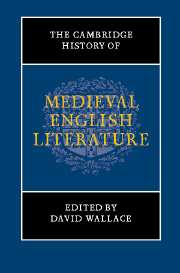Book contents
- Frontmatter
- I AFTER THE NORMAN CONQUEST
- II WRITING IN THE BRITISH ISLES
- Introduction
- 7 Writing in Wales
- 8 Writing in Ireland
- 9 Writing in Scotland, 1058–1560
- 10 Writing history in England
- 11 London texts and literate practice
- III INSTITUTIONAL PRODUCTION
- IV AFTER THE BLACK DEATH
- V BEFORE THE REFORMATION
- Chronological outline of historical events and texts in Britain, 1050–1550
- Bibliography
- Index of manuscripts
- Index
- References
10 - Writing history in England
from II - WRITING IN THE BRITISH ISLES
Published online by Cambridge University Press: 28 March 2008
- Frontmatter
- I AFTER THE NORMAN CONQUEST
- II WRITING IN THE BRITISH ISLES
- Introduction
- 7 Writing in Wales
- 8 Writing in Ireland
- 9 Writing in Scotland, 1058–1560
- 10 Writing history in England
- 11 London texts and literate practice
- III INSTITUTIONAL PRODUCTION
- IV AFTER THE BLACK DEATH
- V BEFORE THE REFORMATION
- Chronological outline of historical events and texts in Britain, 1050–1550
- Bibliography
- Index of manuscripts
- Index
- References
Summary
History, if not historical writing, was fundamental to medieval English experience and thought. The Christianity sustained by the clerical institutions responsible for most – although far from all – of the vast quantities of medieval historical writing was, as it still is, inherently a historical religion. Definitions and assertions of temporal communities, dominion, and other social ideals and institutions were likewise emphatically based on historical circumstances or claims, in everything from monastic land tenures to England’s dominion over Scotland; from aristocratic and royal inheritance and status to peasants’ justifications of rebellion. As John of Salisbury in the mid-twelfth century remarked, historical writings were useful for many things: they revealed the invisible things of God, offered examples of reward and punishment, and helped establish or abolish customs and strengthen or destroy privileges.
John’s remark implies that historical writing both reveals and makes history and society, preserving but also shaping both past and present. To limit the scope but also to emphasize this relation between past visions and contemporary purposes, this chapter will treat long historical narratives in Latin, Anglo-Norman and Middle English that continue up to or are meant to continue up to the writers’ contemporary worlds. Even in this relatively narrow category, many hundreds of such works are extant, only some of the most representative or notable of which may here be considered.
- Type
- Chapter
- Information
- The Cambridge History of Medieval English Literature , pp. 255 - 283Publisher: Cambridge University PressPrint publication year: 1999
References
- 8
- Cited by

